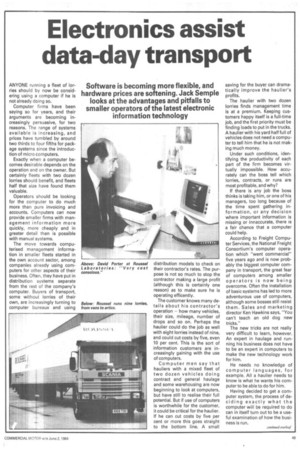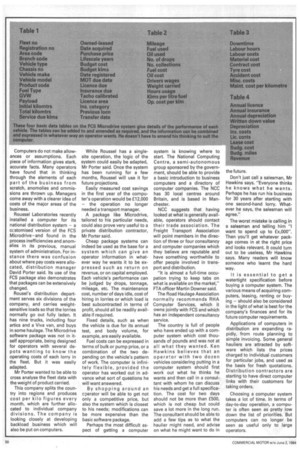Electronics assist data-day transport
Page 51

Page 52

If you've noticed an error in this article please click here to report it so we can fix it.
Software is becoming more flexible, and hardware prices are softening. Jack Semple looks at the advantages and pitfalls to smaller operators of the latest electronic information technology
ANYONE running a fleet of lorries should by now be considering using a computer if he is not already doing so.
Computer firms have been saying so for years, and their arguments are becoming increasingly persuasive, for two reasons. The range of systems available is increasing, and prices have tumbled by around two thirds to four fifths for package systems since the introduction of micro computers.
Exactly when a computer becomes desirable depends on the operation and on the owner. But certainly fleets with two dozen lorries should benefit, and fleets half that size have found them valuable.
Operators should be looking for the computer to do much more than pure invoicing and accounts. Computers can now provide smaller firms with management information more quickly, more cheaply and in greater detail than is possible with manual systems.
The move towards computerised management information in smaller fleets started in the own account sector, among companies already using computers for other aspects of their business. Often, they have put in distribution systems separate from the rest of the company's computer. Buyers of transport, some without lorries of their own, are increasingly turning to computer bureaux and using distribution models to check on their contractor's rates. The purpose is not so much to stop the contractor making a large profit (although this is certainly one reason) as to make sure he is operating efficently.
The customer knows many details about his contractor's operation — how many vehicles, their size, mileage, number of drops and so on. Perhaps the haulier could do the job as well with eight lorries instead of nine, and could cut costs by five, even 10 per cent. This is the sort of information customers are increasingly gaining with the use of computers.
Computer men say that hauliers with a mixed fleet of two dozen vehicles doing contract and general haulage and some warehousing are now beginning to look at computers, but have still to realise their full potential. But if use of computers is worthwhile for the customer, it could be critical for the haulier. If he can cut costs by five per cent or more this goes straight to the bottom line. A small saving for the buyer can dramatically improve the haulier's profits.
The haulier with two dozen lorries finds management time is at a premium. Keeping customers happy itself is a full-time job, and the first priority must be finding loads to put in the trucks. A haulier with his yard half full of vehicles does not need a computer to tell him that he is not making much money.
Under such conditions, identifying the productivity of each part of the firm becomes virtually impossible. How accu rately can the boss tell which lorries, contracts, or runs are most profitable, and why?
If there is any job the boss thinks is taking him, or one of his managers, too long because of the time spent gathering information, or any decision where important information is missing or innaccurate, there is a fair chance that a computer could help.
According to Freight Computer Services, the National Freight Consortium's computer opera tion which "went commercial" five years ago and is now prob ably the biggest computer com pany in transport, the great fear of computers among smaller operators is now being overcome. Often the installation of basic systems has led to more adventurous use of computers, although some bosses still resist them. Sales and marketing director Ken Hawkins says, "You can't teach an old dog new tricks."
The new tricks are not really very difficult to learn, however.
An expert in haulage and running his business does not have to be an expert in computers to make the new technology work for him.
He needs no knowledge of computer languages, for example. All a haulier needs to know is what he wants his computer to be able to do for him.
Having decided to get a computer system, the process of de ciding exactly what the computer will be required to do can in itself turn out to be a useful examination of how the business is run.
Computers do not make allowances or assumptions. Each piece of information gives stark, accurate facts. Many operators have found that in thinking through the elements of each part of the business from scratch, anomolies and ommissions are thrown up. Managers come away with a clearer idea of costs of the major areas of the business.
Roussel Laboratories recently installed a computer for its national distribution system — a customised version of the FCS Microdrive—and found in the process inefficiencies and anomalies in its previous, manual system of administration. For instance there was confusion about where pay costs were allocated, distribution manager David Porter said. Its use of the FCS package also demonstrates that packages can be extensively changed.
Rousel's distribution department serves six divisions of the company, and carries weightsensitive loads so that the lorries normally go out fully laden. It has nine trucks, including four artics and a Viva van, and buys in some haulage. The Microdrive software package was not in itself appropriate, being designed for operators with several depots wanting to know the operating costs of each lorry in the fleet. But it was easily adapted.
Mr Porter wanted to be able to cross analyse the fleet data with the weight of product carried.
This company splits the country into regions and produces cost per kilo figures every month, which are further allocated to individual company divisions. The company is looking closely at developing backload business which will also be put on computers. While Roussel has a singlesite operation, the logic of the system could easily be adapted, Mr Porter said. Once the system has been running for a few months, Roussel will use it for future projections.
Easily measured cost savings in the first year of the computer's operation would be £12,000 — the operation no longer needed a transport manager.
A package like Microdrive, tailored to his particular needs, could also prove very useful to a private distribution contractor, Mr Porter said.
Cheap package systems can indeed be used as the base for a system which can give an operator information in whatever way he wants it to be expressed such as return on revenue, or on capital employed. Each vehicle's performance can be judged by drops, tonnage, mileage, etc. The maintenance cost, number of days idle, cost of hiring in lorries or which load is best subcontracted in terms of profit, should all be readily available if required.
Fixed details, such as when the vehicle is due for its annual test, and body volume, for example, are easily available.
Fuel costs can be expressed in terms of bulk or pump price, or a combination of the two depending on the vehicle's pattern of work. The computer is infinitely flexible, provided the operator has worked out in advance what sort of questions he will want answered.
By shopping around an cperator will be able to get not only a competitive price, but also the system which is closest to his needs; modifications can be more expensive than the basic software package.
Perhaps the most difficult aspect of getting a computer system is knowing where to start. The National Computing Centre, a semi-autonomous group sponsored by the government, should be able to provide a basic introduction to business computers and a directory of computer companies. The NCC has 30 local centres around Britain, and is based in Manchester.
NCC suggests that having looked at what is generally available, operators should contact their trade association. The Freight Transport Association will point members in the direction of three or four consultancy and computer companies which they believe are reputable and have something worthwhile to offer people involved in transport and distribution.
"It is almost a full-time occupation trying to keep tabs on what is available on the market," FTA officer Martin Downer said.
The Road Haulage Association normally recommends RHA Computer Services, which it owns jointly with FCS and which has an independent consultancy service.
The country is full of people who have ended up with a computer system which cost thousands of pounds and was not at all what they wanted. Ken Hawkins believes that an operator with two dozen vehicles considering putting in a computer system should first work out what he thinks he wants and then call in a consultant with whom he can discuss his needs and get a full specification. The cost for two days should not be more than £500, which is not cheap but could save a lot more in the long run. The consultant should be able to add a few tips as to what the haulier might need, and advise on what he might want to do in the future.
Don't just call a salesman, Mr Hawkins says. "Everyone thinks he knows what he wants. Perhaps he has run his business for 30 years after starting with one second-hand lorry. Whatever he says, the salesman will agree."
The worst mistake is calling in a salesman and telling him "I want to spend up to fx,000". Then you'll get whatever package comes in at the right price and looks relevant. It could turn out to be useless, Mr Hawkins says. Many readers will know someone who learnt the hard way.
It is essential to get a watertight specification before buying a computer system. The various means of acquiring computers, leasing, renting or buying — should also be considered in the light of what is best for the company's finances and for its future computer requirements.
Applications of computers in distribution are expanding rapidly, from route planning to simple invoicing. Some general hauliers are attracted by software which lists the prices charged to individual customers for particular jobs, and used as the basis for fresh quotations. Distribution contractors are starting to have direct computer links with their customers for taking orders.
Choosing a computer system takes a lot of time. In terms of day-to-day operation, a computer is often seen as pretty low down the list of priorities. But computers can no longer be seen as useful only to large operators.
























































































